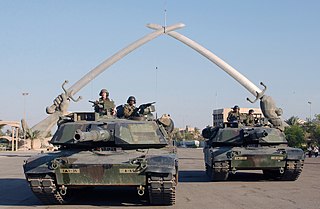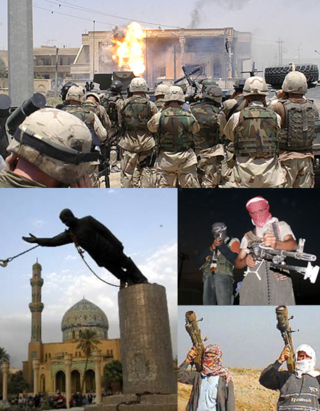Related Research Articles

Saddam Hussein Abd al-Majid al-Tikriti, was an Iraqi politician and revolutionary who served as the fifth president of Iraq from 1979 to 2003. He also served as prime minister of Iraq from 1979 to 1991 and later from 1994 to 2003. He was a leading member of the revolutionary Arab Socialist Ba'ath Party, and later, the Baghdad-based Ba'ath Party and its regional organization, the Iraqi Ba'ath Party, which espoused Ba'athism, a mix of Arab nationalism and Arab socialism.

Iraq actively researched and later employed weapons of mass destruction (WMD) from 1962 to 1991, when it destroyed its chemical weapons stockpile and halted its biological and nuclear weapon programs as required by the United Nations Security Council. The fifth president of Iraq, Saddam Hussein, was internationally condemned for his use of chemical weapons against Iranian and Kurdish civilians during the Iran–Iraq War in the 1980s. Saddam pursued an extensive biological weapons program and a nuclear weapons program, though no nuclear bomb was built. After the Gulf War, the United Nations located and destroyed large quantities of Iraqi chemical weapons and related equipment and materials; Iraq ceased its chemical, biological and nuclear programs.

Tariq Aziz was an Iraqi politician who served as Deputy Prime Minister, Minister of Foreign Affairs and a close advisor of President Saddam Hussein. Their association began in the 1950s when both were activists for the then-banned Arab Socialist Ba'ath Party. He was both an Arab nationalist and a member of the Chaldean Catholic Church.

Iraq under the Arab Socialist Ba'ath Party saw severe violations of human rights. Secret police, state terrorism, torture, mass murder, genocide, ethnic cleansing, rape, deportations, extrajudicial killings, forced disappearances, assassinations, chemical warfare, and the destruction of the Mesopotamian marshes were some of the methods Saddam Hussein and the country's Ba'athist government used to maintain control. Saddam committed crimes of aggression during the Iran–Iraq War and the Gulf War, which violated the Charter of the United Nations. The total number of deaths and disappearances related to repression during this period is unknown, but is estimated to be at least 250,000 to 290,000 according to Human Rights Watch, with the great majority of those occurring as a result of the Anfal genocide in 1988 and the suppression of the uprisings in Iraq in 1991. Human Rights Watch and Amnesty International issued regular reports of widespread imprisonment and torture.
The Halabja massacre, also known as the Halabja chemical attack, was a massacre of Kurdish people that took place on 16 March 1988, during the Iraqi–Kurdish conflict in the closing days of the Iran–Iraq War in Halabja, Kurdistan, Iraq. The attack was part of the Al-Anfal Campaign in Kurdistan, as well as part of the Iraqi Army's attempt to repel the Iranian Operation Zafar 7. It took place 48 hours after the capture of the town by the Iranian Army. A United Nations (UN) medical investigation concluded that mustard gas was used in the attack, along with unidentified nerve agents.

William Ramsey Clark was an American lawyer, activist, and federal government official. A progressive, New Frontier liberal, he occupied senior positions in the United States Department of Justice under Presidents John F. Kennedy and Lyndon B. Johnson, serving as United States Attorney General from 1967 to 1969; previously, he was Deputy Attorney General from 1965 to 1967 and Assistant Attorney General from 1961 to 1965.

Fallujah is a city in Al Anbar Governorate, Iraq. Situated on the Euphrates River, it is located roughly 69 kilometres (43 mi) to the west of the capital city of Baghdad.

During the early stages of the Iraq War, members of the United States Army and the Central Intelligence Agency committed a series of human rights violations and war crimes against detainees in the Abu Ghraib prison in Iraq, including physical abuse, sexual humiliation, physical and psychological torture, and rape, as well the killing of Manadel al-Jamadi and the desecration of his body. The abuses came to public attention with the publication of photographs of the abuse by CBS News in April 2004. The incidents caused shock and outrage, receiving widespread condemnation within the United States and internationally.
The Iraqi High Tribunal (IHT), formerly the Iraqi Special Tribunal and sometimes referred to as the Supreme Iraqi Criminal Tribunal, is a body established under Iraqi national law to try Iraqi nationals or residents accused of genocide, crimes against humanity, war crimes or other serious crimes committed between 1968 and 2003. It organized the trial of Saddam Hussein and other members of his Ba'ath Party regime.
The Saddam–al-Qaeda conspiracy theory was based on false claims made by the United States government, alleging that a highly secretive relationship existed between Iraqi president Saddam Hussein and the Sunni pan-Islamist militant organization al-Qaeda between 1992 and 2003. The George W. Bush administration promoted it as a main rationale for invading Iraq in 2003.
On 6 August 1990, four days after the Iraqi invasion of Kuwait, the United Nations Security Council (UNSC) placed a comprehensive embargo on Iraq. The sanctions stayed largely in force until 22 May 2003, and persisted in part, including reparations to Kuwait. The original stated purposes of the sanctions were to compel Iraq to withdraw from Kuwait, to pay reparations, and to disclose and eliminate any weapons of mass destruction (WMD).

The trial of Saddam Hussein was the trial of the deposed President of Iraq Saddam Hussein by the Iraqi Interim Government for crimes against humanity during his time in office.

There are various rationales for the Iraq War, both the 2003 invasion of Iraq and the subsequent hostilities. The George W. Bush administration began actively pressing for military intervention in Iraq in late 2001. The primary rationalization for the Iraq War was articulated by a joint resolution of the United States Congress known as the Iraq Resolution. The US claimed the intent was to "disarm Iraq of weapons of mass destruction, to end Saddam Hussein's alleged support for terrorism, and to supposedly free Iraqi people".

A dispute exists over the legitimacy of the 2003 invasion of Iraq. The debate centers around the question whether the invasion was an unprovoked assault on an independent country that may have breached international law, or if the United Nations Security Council authorized the invasion. Those arguing for its legitimacy often point to Congressional Joint Resolution 114 and UN Security Council resolutions, such as Resolution 1441 and Resolution 678. Those arguing against its legitimacy also cite some of the same sources, stating they do not actually permit war but instead lay out conditions that must be met before war can be declared. Furthermore, the Security Council may only authorise the use of force against an "aggressor" in the interests of preserving peace, whereas the 2003 invasion of Iraq was not provoked by any aggressive military action.

The Iraq War was a protracted armed conflict in Iraq from 2003 to 2011. It began with the invasion of Iraq by the United States-led coalition that overthrew the Ba'athist government of Saddam Hussein. The conflict continued for much of the next decade as an insurgency emerged to oppose the coalition forces and the post-invasion Iraqi government. US troops were officially withdrawn in 2011. The United States became re-involved in 2014 at the head of a new coalition, and the insurgency and many dimensions of the armed conflict are ongoing. The invasion occurred as part of the George W. Bush administration's war on terror following the September 11 attacks.
In the runup to the 2003 invasion of Iraq, press stories appeared in the United Kingdom and United States of a plastic shredder or wood chipper into which Saddam and Qusay Hussein fed opponents of their Baathist rule. These stories attracted worldwide attention and boosted support for military action, in stories with titles such as "See men shredded, then say you don't back war". A year later, it was determined there was not enough evidence to support the existence of such a machine.

The 1991 Iraqi uprisings were ethnic and religious uprisings against Saddam Hussein's regime in Iraq that were led by Shi'ites and Kurds. The uprisings lasted from March to April 1991 after a ceasefire following the end of the Gulf War. The mostly uncoordinated insurgency was fueled by the perception that Iraqi President Saddam Hussein had become vulnerable to regime change. This perception of weakness was largely the result of the outcome of the Iran–Iraq War and the Gulf War, both of which occurred within a single decade and devastated the population and economy of Iraq.

Mass graves in Iraq have become well known since the 2003 invasion of Iraq toppled the regime of Saddam Hussein. International Experts estimated that 300,000 victims could be in these mass graves alone. The mass graves mostly included the remains of Shia Muslims and ethnic Kurds, who were killed for opposing the regime between 1983 and 1991.

Zainab Salbi is an Iraqi American women's rights activist, writer, television show host, and podcaster. She is the co-founder of Daughters for Earth, a fund and a movement of Daughters rising up worldwide with climate solutions to protect and restore Mother Earth. She is also the co-founder of Women for Women International, a non-profit organization that helps women affected by sexual violence and conflict. She hosted Through Her Eyes and #MeToo, Now What? television shows, about issues affecting women. From 2022 she hosted the Redefined podcast.
Safia Taleb Ali al-Suhail is an Iraqi politician who currently serves as an Ambassador of Iraq to Saudi Arabia, having previously served as the ambassador to Italy and Jordan. She was appointed the first female ambassador of Iraq in Oman in 2004, and she held important political and diplomatic positions in the country, including: a member of the Iraqi parliament for two parliamentary sessions on the capital Baghdad in the period 2005-2014, and the head of the Europe Department in the Iraqi Ministry of Foreign Affairs from 2014-2016, and the ambassador of the Republic of Iraq. To the Hashemite Kingdom of Jordan in the period 2016-2019 ”, She was a former member of the Council of Representatives of Iraq who was elected in December 2005 for the secular Iraqi National List.
References
General
- Langewiesche, William (March 2005). "The Accuser". The Atlantic . Retrieved December 27, 2010.
Inline
- ↑ Nomani, Asra (April 10, 2005). "Hania Mufti: Saddam's Nemesis". Time . Archived from the original on December 9, 2006. Retrieved December 27, 2010.